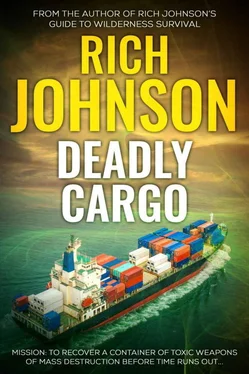He turned to walk away, but the lure of eleven million dollars was working in the minds of his men, and none of them wanted to leave the trailer behind. Without hesitation, he drew the pistol and fired a shot at the container. The round ricocheted into the tropical sky with a whine, and every man jumped off the barge and walked quickly down the dock toward the main house. “I don’t deal well with disobedience, men,” Juanico shouted. “That’s the last warning you’ll ever get.”
In the dim recess of his bleary mind, Husam al Din thought he heard the sound of a bullet ringing somewhere. He felt half dead, but dragged his aching body from the corner where he had fallen and was covered by an avalanche of a stinking mattress and a pile of filthy blankets. How long he had been there, he had no idea. He rubbed his face and blinked. Is that light I see? Yes, there was daylight in the trailer. Maybe I’m in Miami and they’ve off-loaded the container.
He dug through the debris covering the trailer floor and found his duffel bag, grabbed the web handles and headed toward the light.
A wave of fresh air met Husam al Din as he reached the open door to the trailer and squinted into the bright sunlight. He inhaled deeply. Thick, warm and humid as the air was, at least it smelled fresh, and he was thankful to have something to breathe other than the putrid stench that had been locked inside the foul container. The clean air stimulated his lungs, and as he inhaled again and again, oxygen began to awaken his mind. His eyes adjusted to the brightness of the day, and for a moment he stood just inside the trailer, taking advantage of the shadow for concealment as he tried to make sense of what was around him.
This is not right. Why is the trailer lying at such an angle, half in and half out of the container? It was a puzzle. The scene outside was clearly not the container yard at the Miami shipping terminal. In the distance, he heard voices trailing away, and he quietly peered in their direction. Through the trees he saw a cluster of men walking away from him, heading toward a small building a few hundred yards distant across a clearing. With duffel bag in hand, he leaned out the doorway and looked up at the canopy formed by high branches of tropical trees that lined both banks of the river. Where am I?
After the men entered the building and were out of sight, he stepped down onto the barge and studied his surroundings. A small tug was tied behind the barge, and beyond that was a red and black boat that looked fast. Without a sound, he moved first to the tug and stepped inside the cabin to look for charts that would tell him where he was. A quick look told him that this was an old work vessel, but it was equipped with a GPS. He pressed the button to turn it on, and waited as the display indicating satellite linkage blinked on and off. It’s the trees. They’re blocking satellite signals.
A short distance down the dock from the tug, a sleek 26-foot powerboat was tied bow and stern. Before leaving the tug cabin, he watched and listened for the men he had seen earlier, but there was no movement and no noise coming from the direction of the house. He felt his energy returning and he moved swiftly to the powerboat, climbed aboard and placed the duffel bag on the floor at the foot of the driver’s seat.
The dash was equipped with a VHF radio, a full complement of gauges, and a chart plotter. He spotted the small, mushroom-shaped GPS antenna next to the radio antenna on the stainless steel targa arch. A pair of 225-horsepower outboard motors stood ready for action, and the keys were in the ignition. A cuddy cabin stood open, so he ducked below to see what he could find. Held to the roof overhead by a pair of bungee cords was a plastic tube. He pulled the tube down and shook out the rolled paper chart, then spread it on the small forepeak bunk. It was a chart of the western Caribbean, showing Panama to the south and a cluster of islands along the eastern coast of Costa Rica, Nicaragua, Honduras, Belize and the Yucatan Peninsula. In the upper right-hand corner was the western tip of Cuba, and as he studied that part of the chart, he knew that he was getting closer to accomplishing his goal because Miami was not far from Cuba.
He stepped back up to the cockpit and tossed the rolled chart on top of the dashboard, then turned the ignition key to start the port engine. It jumped to life and settled into a quiet rumble as he let the motor warm up at idle. Over his shoulder, he glanced at the building, but there was no movement. He stepped onto the dock and untied the bow line, coiled it quickly and tossed it onto the foredeck, then released the stern line. With a gentle push, the boat floated away from the dock and he scrambled aboard, spun the wheel and pushed the throttle. The boat responded instantly, turning out into the center of the river channel and gliding past the tug and the barge.
A moment later, he was clear of the overhanging trees, and the GPS indicated strong signals from six satellites. By the time he left the mouth of the river, Husam al Din had his coordinates. This is where I am. He drew an imaginary line on the chart with his finger. And that is where I am going. He turned the starboard ignition key and felt the second engine roar to life and brought the starboard throttle equal with the port throttle, then threw both throttles all the way forward. The boat came up on plane and leapt ahead.
Station Panama, Coast Guard Communication Center.
“Station Panama, Station Panama, Station Panama, this is Borboleta, over.”
“This is Station Panama, over.”
“This is Borboleta. I have an urgent message to relay from Whisper, a catamaran sailing in the vicinity of San Luis Miguel.”
“Go ahead with your relay,” the young communications officer said. Over the next several minutes, the owner of Borboleta gave a description of the Whisper and the Plover family, the container, the piracy incident and their escape from Juan Baptista de la Vega.
“ Borboleta, is anyone aboard Whisper currently in danger or in need of medical attention?”
“Negative. To my knowledge, they are all safe now and are proceeding toward Rio Dulce in Guatemala. But, I say old man, they’ve had a bugger of a time. They are citizens of your country. Perhaps you could do something for them.”
“Thank you for your report. I will process this information through the proper channels. Station Panama out.”
No sooner had he ended the radio transmission than the communications officer picked up the phone and pressed a speed-dial number. “Captain Pfister,” the voice on the phone said.
“Sir, this is Gable in com. I’ve just received a report of a container being found near San Luis Miguel. And there was a piracy incident involving an American family.”
The news brought Pfister bolt upright in his chair. “I’m on my way. Have all the details printed out for me in…” – he looked at his watch – “…six minutes.”
“Aye, sir,” Gable said, and the phone went dead.
As soon as he had a dial tone, Pfister punched in the numbers for Josh Adams’ cell phone. It rang twice, then a voice answered. “Josh here.”
“Mr Adams, another player just came into your game. Meet me in com as quickly as you can get there.”
“Ten minutes?”
“I’ll have a helmet ready for you.”
San Luis Miguel Island
Antonio Souza was out of breath when he reached the small house. “Juanico, the boat is gone.”
Irritation flooded Juanico’s voice, “What boat?”
“The red and black boat. The boss’s pride and joy. It’s gone.”
Читать дальше












